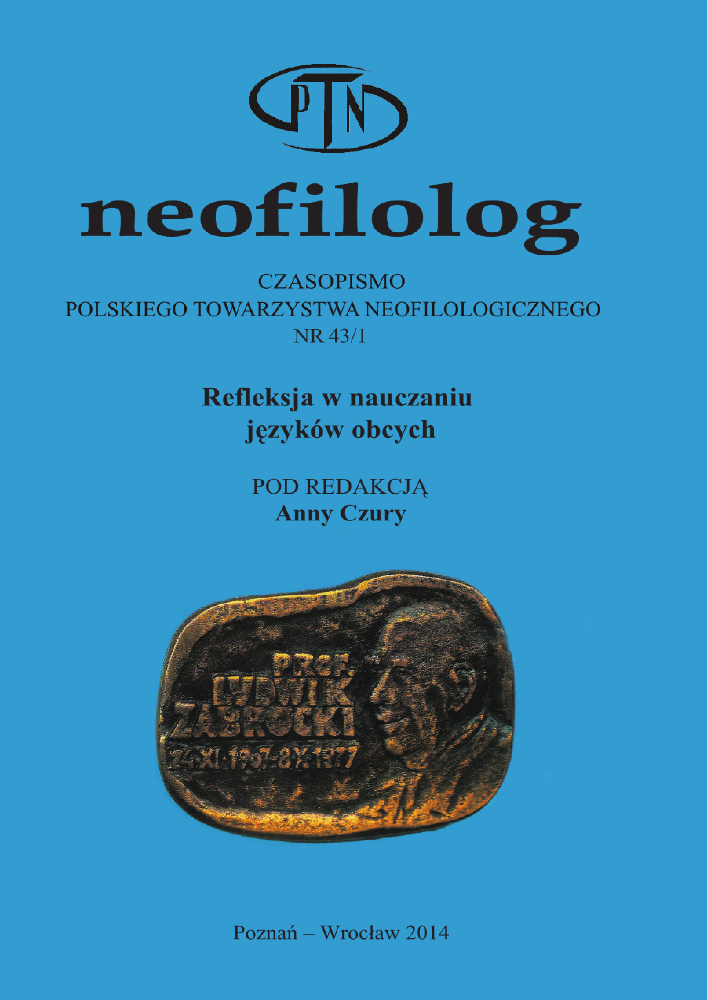Abstract
In the era of globalisation a command of foreign languages is regarded as a priority. For this reason, the Council of Europe and the European Commission promote language learning and linguistic diversity. A focal point in their language policy is reflection, which is recognized as a key feature of an employee’s professionalism. Therefore, the importance of reflection is stressed throughout all the years of language education. The objective of this paper is to give information about the documents, tools and actions which support a reflective approach to language learning and teaching in Europe.References
Adams-Tukiendorf, M. 2012. „Rozwijanie refleksji u nauczyciela z wykorzystaniem gry coachingowej POINTS of YOU The coaching gameˮ (w:) PLEJ czyli psycholingwistyczne eksploracje językowe (red. O. Majchrzak). Łódź: Wydawnictwo Uniwersytetu Łódzkiego: 13-26.
Arnold, J. (red.). 1998. Affect in Language Learning. Cambridge: Cambridge University Press.
Boud, D. i D. Walker. 1998. „Promoting reflection in professional courses: the challenge of contextˮ Studies in Higher Education 23(2): 45-59.
Candelier, M. i A. Schröder-Sura. 2012. „Wspieranie rozwoju kompetencji różnojęzycznych i międzykulturowych w klasie szkolnejˮ Języki Obce w Szkole 4: 4-11.
Candelier, M., A. Camillieri-Grima, V. Castelotti, J-F. De Pietro, I. Lorincz, F. J. Meisner, A. Noguerol, A. Schröder-Sura i M. Molinié. 2012. FREPA. Competences and Resources. Strasbourg: Council of Europe.
Dewey, J. 1933/2007. Democracy and Education. Teddington: Echo Library.
Dörnyei, Z. 2001. Teaching and Researching Motivation. Harlow: Longman.
Farrell,T. 2007. Reflective Language Teaching: From Research to Practice. London: Continuum.
Fundacja Rozwoju Systemu Edukacji. 2013. „EDUinspiracje 2013 – Historie sukcesu”. http://issuu.com/frse/docs/eduinspiracje_2013/1 DW 25.11.2013.
Kieszkowska, K. 2013. „Projekt Language Rich Europe – badanie i rekomendacjeˮ. Języki Obce w Szkole 2: 119-122.
Kohonen, P. 2000. „Towards experiental foreign language educationˮ (w:) Experiental Learning in Foreign Language Education (red. V. Kohonen). London: Pearson Education: 78-95.
Komorowska, H. 2007. Metodyka nauczania języków obcych w Polsce (1957-2007). Warszawa: CODN.
Pawlak, M. 2010. „Designing and piloting a tool for the measurement of the use of pronunciation learning strategiesˮ. Research in Language 8: 189-202.
Rada Europy. 2003. Europejski system opisu kształcenia językowego: uczenie się, nauczanie, ocenianie. Warszawa: CODN.
Rada Europy. 2009. Autobiography of Intercultural Encounters. Context, Concepts, and Theories. Strasbourg: Language Policy Division.
Rokoszewska, K. 2012. „The influence of pronunciation learning strategies on mastering English vowelsˮ. Studies in Second Language Learning and Teaching 2(3): 391-413.
Schön, D. A. 1987. Educating the Reflective Practitioner. San Fransisco: Jossey Bass.
Smith, A. i S. Lennon. 2011. „Problem solving and critical inquiry in the written and oral reflections of middle school preservice teachers' classroom experiencesˮ. RMLE Online: Research in Middle Level Education 35(1): 1-11.
Szczuka-Dorna, L. 2012. „Europa bogata językami. Trendy w strategiach i praktykach dotyczących wielojęzyczności w Europieˮ. Języki Obce w Szkole 4: 102-103.
Tranter, G. 2003. „Wspólny europejski obszar odniesienia – Dlaczego? Jak? Co?ˮ. Sprachenservice Erwachsenenbildung 36: 34-45.
Whitmore, J. 2002. Coaching for Performance. GROWing People, Performance and Purpose. London: Nicholas Brealey.
License
Copyright (c) 2019 Neofilolog

This work is licensed under a Creative Commons Attribution-NoDerivatives 4.0 International License.
Authors
Authors of texts accepted for publication in Neofilolog are required to complete, sign and return to the Editorial team’s office the Agreement for granting a royalty-free license to works with a commitment to grant a CC sub-license.
Under the agreement, the authors of the texts published in Neofilolog grant Adam Mickiewicz University in Poznań a non-exclusive, royalty-free license and authorize the use of Attribution-NoDerivatives 4.0 International (CC BY-ND 4.0) Creative Commons sub-license.
The authors retain the right to the free disposal of the work.
Users
Interested Internet users are entitled to use works that have been published in Neofilolog since 2017, under the following conditions:
▪ attribution – obligation to provide, together with the distributed work, information about the authorship, title, source (link to the original work, DOI) and the license itself.
▪ no derivatives – the work must be preserved in its original form. Without the author's consent, it is not possible to distribute the modified work in the form of translations, publications, etc.
Copyrights are reserved for all texts published since 2017.
Miscellaneous
Adam Mickiewicz University in Poznań retains the property right as a whole (layout, graphic form, title, cover design, logo etc.).
